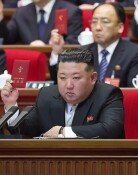Gov`t Gave All the Tuberculosis Vaccines to North Korea
Gov`t Gave All the Tuberculosis Vaccines to North Korea
Posted November. 12, 2001 09:14,
It was revealed that recently there was no Tuberculosis (TB) vaccine called BCG available in the nation for a while because the government unofficially gave all the BCG to North Korea following its emergent request. Accordingly, each health center in the nation was in uproar because people who really needed BCG could not get them.
The government including the Ministry of Health and Welfare supplied 30,000 bottles (approximately for 30,000 people) of BCG to North Korea through a private organization Eugene Bell Foundation on October 10th.
The Eugene Bell said in its official document on August 13th, ``BCG aid not only helps North Korea`s effort to eliminate tuberculosis but also is a small footstep toward reunification. Please help us receive donation in September and October in which goods are to be sent.``
Accordingly, the government decided to give BCG to North Korea, which needed to be supplied to the nation in early October, since it became difficult to produce new BCG in a give time.
The problem was that there was no BCG in the nation for three days from November 6 because the government was not fully aware of the domestic supply condition but unreasonably gave all the vaccines to North Korea.
An official of `Y` health center in Seoul said, ``We immunize people against tuberculosis every Tuesday and Friday. But, we had to send back new born babies and homeless people who came for vaccination on 6th.``
The domestic blank of BCG began to be resolved as newly produced additional vaccines began to be supplied on 9th, after having sent all the government possessed BCG to North Korea. The Tuberculosis Research Institute notified each branch `not to reveal this incident to the outside`.
The domestic BCG is produced by the Tuberculosis Research Institute, and is supplied to 242 health centers in the nation with no charge after being examined its safety and evaluation of effectiveness by the division of bacteria product in the Korea Food and Drug Administration.
An official of the National Institute of Health explained that the incident of the blank of BCG was a mistake made based on misjudgment of the supply time since the examination of the additional production was too long (22 weeks). However, the medical circle said in agreement that this was a clear case of the government`s `giving` policy on North Korea` when the domestic demand for BCG is not quite low due to the increasing numbers of homeless people since the IMF structure.
Moreover, the medical circle also pointed out that the blank state of BCG due to the mistake in the process of supply indicated the gapping hole in the government enterprise which is operated in accordance with the annual contagious disease prevention enterprise.
In fact, 429,000 people among the population who are older than 5 years old are tuberculosis carriers, and 170,000 among them are being treated as patients.
According to the Korean National Tuberculosis Association, there are 42,000 new tuberculosis patients this year, and 3,000 people die from tuberculosis every year.
gdt@donga.com







